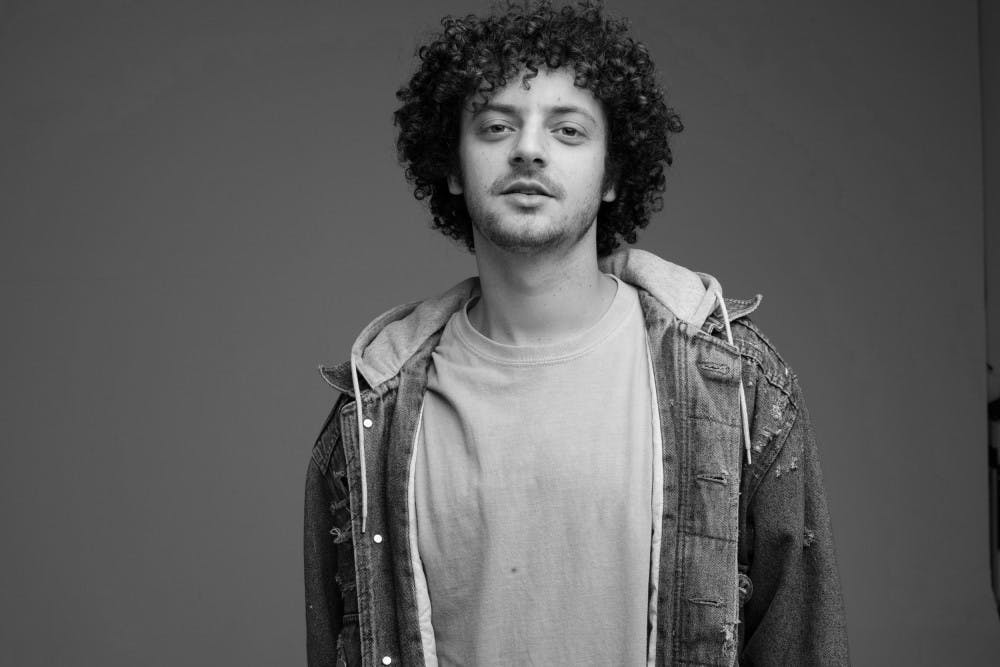In Aristotle's tragic plot structure, the first half of a tragedy shows the protagonist on the rise, before the unfolding events of the first act culminate in a sudden change of fortune. The second act, then, is beset by pity and fear before an ultimately tragic and cathartic ending. Understanding this classical plot structure helps when making sense of the new EP a modern tragedy vol. 2, released on Feb. 22 by Canadian hip–hop artist Jordan Edward Benjamin, better known as grandson.
grandson's early single releases had a harder rock bent to them: 2016's "Bills" and "Bury Me Face Down" would almost qualify as garage rock, with their more melodic vocals and emphasis on guitar riffs. It was 2017's "Best Friends" that started his progression into alternative hip–hop, and by the release of 2018 EP a modern tragedy vol. 1, it seemed like Benjamin had found his signature voice, with catchy and rhythmic rhymes placed over distorted, almost bluesy guitars and basses. This blending of genres is the natural outcome of grandson's inspirations: Rage Against the Machine, Bob Marley, John Lennon, and Nirvana.
a modern tragedy vol. 1's signature sound was spoofed by grandson himself in a recent Facebook post showing a paper marked "HOW TO: a modern tragedy, vol. 1." It shows a five–step path to success, starting with "pick a topic" and ending with "make it REALLY good and have it blow up." Whether the tone of the song is "sad and moody" or "angry yelling, distorted guitar and loud stuff," distorted vocals and guitars stand out as other signature elements.
The naming conventions of vol. 2 would posit it as a direct sequel to vol. 1, and the lead–off single "Apologize" seems to confirm those suspicions, featuring a bass riff intro and Benjamin's vocals, before the chorus blows up with heavy drum beats and more distorted background, with a signature guitar riff between verses. When the rest of the EP was released, however, it sounded a bit different.
When it comes to subject matter, every song has its place in the traditional grandson canon: after "Apologize" introduces grandson's intent to keep moving forward with his music and life, "Stigmata" uses violent imagery as a metaphor for political corruption, while "Is This What You Wanted" addresses the effects of this corruption on the public: "We don't care, we don't mind / Pretend everything is awesome / While the world burns outside." "Fallin' (Temptation)" moves from the political to the personal as the narrator describes a return to old vices in the aftermath of a messy breakup. The EP closes with "Darkside," describing how a bullied child becomes a school shooter.
Lyrically, most of the tracks on vol. 2 read as natural sequels or parallels to vol. 1. "blood // water," the parallel to "Stigmata," condemned government officials who silence objectors rather than address societal issues, while "6:00," shows a public so desensitized to a constant stream of violence and corruption that they decide to accept this new status quo, much like "Is This What You Wanted." "Fallin'" combines "Despicable" and "Overdose," the former about a self–destructive ex–lover and the latter about an addict realizing that their coping mechanisms may be unhealthy. "Darkside" follows almost the same trajectory as "Stick Up," only with a child rather than an impoverished veteran. It may also serve as a prequel to "thoughts & prayers," a single released in the aftermath of the Parkland mass shooting.
Acoustics are where vol. 2 takes a sharp detour from vol. 1. Most of the songs in the first volume are fueled by anger, from the shouted rhymes, to the overdriven guitars, while both vocals and instrumentals sound slower and muddier in this new volume. Even the moodier tracks on vol. 1, like "Overdose," felt cleaner, stripped down to vocals and guitar, while drums and droning sounds pervade “Fallin’.” Compare Benjamin’s shouted “I saw the body drop” on “6:00” to the sad instrumentals and lethargic rhymes in the chorus of “Is This What You Wanted.” Even the anger in the bridge as Benjamin yells “I am the thing you created” seems more subdued than in vol. 1.
In the Aristotelian tragedy, “Apologize” would serve as that reversal of fortune. grandson has no intention of apologizing for his past or for stepping down in the fight against political corruption and societal injustices, but he’s tired. Upon first listen, a modern tragedy vol. 2 sounds nothing like its first part, but repeated listening makes it clear that these are two halves of a whole: the lyrics remain parallel, grandson’s intentions and beliefs have not changed, but the fatigue of constant resistance is wearing on him. Perhaps on vol. 3, these injustices will have been corrected, and the narrative will move from the rising action of vol. 1 and the pity and fear of vol. 2 into its final catharsis.







